The UK and Germany have signed the groundbreaking Trinity House Agreement, a defence pact that will see the two nations collaborate on developing new long-range strike weapons and bolster the UK defence industry.
The agreement, signed by Defence Secretary John Healey MP and German Defence Minister Boris Pistorius, aims to strengthen European security and drive investment in both countries.
A key feature of the agreement is the joint development of a new long-range strike system designed to be more precise and have greater range than current systems, such as the Storm Shadow. This initiative will significantly enhance NATO’s ability to respond to threats more effectively, particularly in the context of growing Russian aggression in Eastern Europe.
The Trinity House Agreement will also deliver a substantial boost to the UK economy, paving the way for the construction of a new artillery gun barrel manufacturing facility in the UK. The factory, operated by German defence company Rheinmetall, will create more than 400 jobs and bring nearly half a billion pounds to the British economy over the next decade. British steel, produced by Sheffield Forgemasters, will be used in the production of these gun barrels, marking the first time in ten years that the UK has manufactured artillery components domestically.
The agreement also focuses on enhancing cooperation in other areas, such as the production of Boxer armoured vehicles and the development of land-based drones. This collaboration will see both nations’ armies train and exercise together, particularly along NATO’s Eastern Flank, helping to develop new military strategies and strengthen European defence capabilities.
In addition to land-based cooperation, the Trinity House Agreement includes provisions to protect critical underwater infrastructure in the North Sea. The UK and Germany will work together to enhance surveillance and detection of adversary activity, particularly around seabed cables, which are essential for communications and energy security.
German aircraft will also periodically operate out of RAF Lossiemouth in Scotland to help secure the North Atlantic as part of the agreement. These deployments will bolster NATO’s surveillance and defence capabilities in the region.
The agreement includes further collaboration on drone technology, with plans to develop drones that can operate alongside fighter jets, as well as unmanned maritime systems to improve naval operations. Both nations will also cooperate on integrating air defence systems to better protect European airspace from long-range missile threats, building on agreements made at recent NATO Defence Ministers meetings.
The Trinity House Agreement not only strengthens the defence ties between the UK and Germany but also delivers on a long-term commitment to support Ukraine. The UK and Germany will jointly work on modernising German Sea King helicopters with advanced missile systems, and explore additional capability coalitions to further enhance Ukraine’s military capabilities.
Defence Secretary John Healey MP said:
“The Trinity House Agreement is a milestone moment in our relationship with Germany and a major strengthening of Europe’s security.
It secures unprecedented levels of new cooperation with the German Armed Forces and industry, bringing benefits to our shared security and prosperity, protecting our shared values and boosting our defence industrial bases.
This landmark agreement delivers on the Government’s manifesto commitment to strike a new defence relationship with Germany – less than four months since winning the election in July – and we will build on this new cooperation in the months and years ahead.
I pay tribute to our negotiating teams who have worked hard at pace to deliver this.”
German Defence Minister Boris Pistorius said:
“The UK and Germany are moving closer together. With projects across the air, land, sea, and cyber domains, we will jointly increase our defence capabilities, thereby strengthening the European pillar within NATO. We can only strengthen our ability to act together. This is why our cooperation projects are open to other partners.
We must not take security in Europe for granted. Russia is waging war against Ukraine, it is increasing its weapons production immensely and has repeatedly launched hybrid attacks on our partners in Eastern Europe.
With the Trinity House Agreement, we are showing that the NATO Allies have recognised what these times require and are determined to improve their deterrence and defence capabilities. As it lays the foundation for future projects, the Trinity House Agreement is an important contribution to this. It is particularly important to me that we cooperate even more closely to strengthen NATO’s eastern flank and to close critical capability gaps, for instance in the field of long-range strike weapons.”
Armin Papperger, CEO and Chairman of Rheinmetall AG commented that:
“Rheinmetall’s investment in the gun hall reflects a forward-looking approach to innovation, collaboration, and national defence. It ensures the UK remains a leader in developing and manufacturing defence technologies that safeguard both national and global security.”
Gary Nutter, Chief Executive Officer at Sheffield Forgemasters, said:
“I am delighted to confirm that Sheffield Forgemasters will reinstate gun barrels manufacture after a 20-year hiatus, to supply large-calibre gun-barrels to Germany’s Rheinmetall AG, servicing UK defence contracts and exports.”


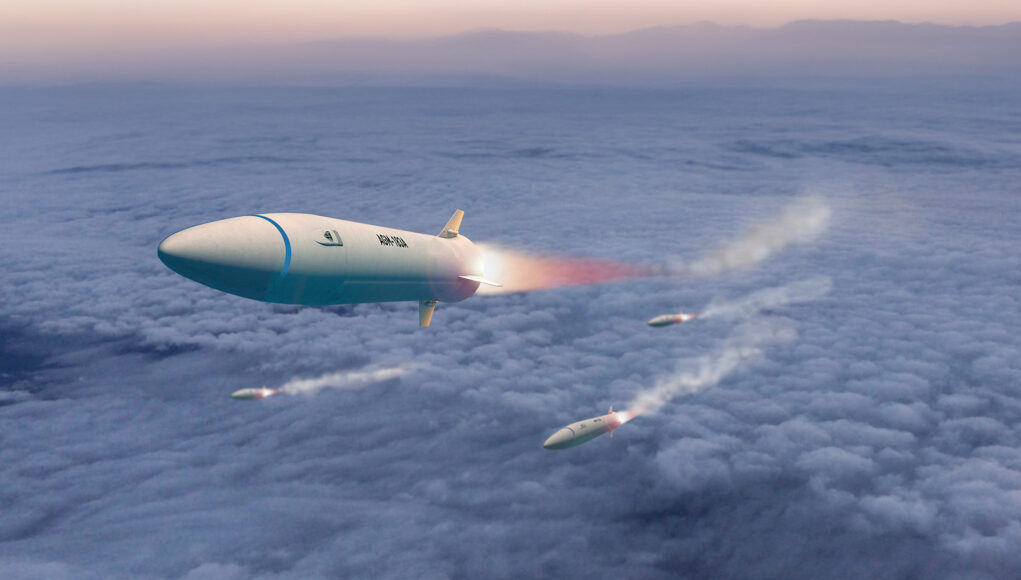

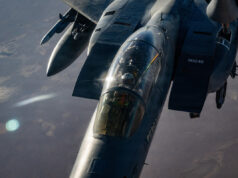
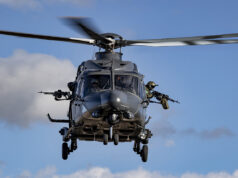

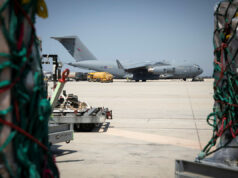
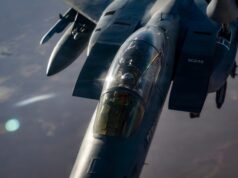
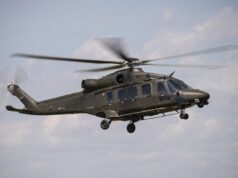
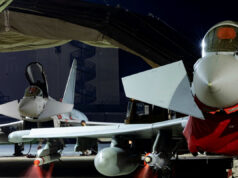
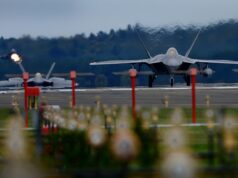
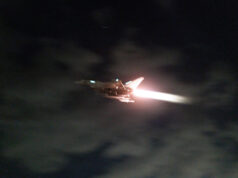

Surely this duplicates with FC/ASW?
The only way a long range strike improvement on SS could be different is if it is ground launched, and then the Precision Strike Missile from M270 already fulfils that capability.
So what is this missile?
PSM and Storm Shadow have ranges of @300 miles. The cruise missile variant of FCASW will presumably have a range at least as great as Scalp Naval- 750+ miles from surface launch. Is this joint venture something with even greater range? I can see why Germany would want the ability to hit targets deep inside Russia to deter the kind of attacks inflicted on Ukraine. 1000 miles +? Ballistic rather than cruise?
I believe the European long range initiative is looking for ranges of 2,000km and beyond. In other words hold targets deep in Russia at threat without depending on the US….
That’s my take on it, Europe needs the capability to defend itself and destroy key targets within Russia should Russia push its luck a little too much and start making territorial claims via hybrid warfare against European NATO territory. I think if Russia can grind out a victory in Ukraine it will look to further conflict within a 18-24 month time period of the Ukraine war finishing.
Just as soon as Putin’s army can re-equip and rebuild munitions stockpiles so the 18-24 month time period is just an estimate, considering Russia’s current perceived industrial capacity from OSINT sources.
I was just going to comment on this.
Is this really necessary with our stretched budget?
We have Storm Shadow.
We have TLAM.
We are developing FC/ASW.
The British Army has an ongoing program and need to by MLRS PSMs to equip the expanding Deep Fires capability.
The budget is overstretched.
The RFA is falling apart.
The army has 14 SPG left.
There are a whole range of urgent fixes needed across defence.
But, it seems Labour need more politics and the need to be closer again to Germany
( which was always the case both before and after Brexit.)
Where is the budget for this?
What gets chopped from elsewhere to pay for it?
Considering we are also throwing 1 billion over 7 years at Hypersonic missile tech.
What is their priority?
Is it cosying up to Germany and France for political reasons, or is there a real need for this at the expense, and duplication, of other programs already in need of funding.
I think some of the AS90’s are still in use? or have they just placed the ones that are left in reserve.
There are still a handful left, they will be off to UKR shortly. Assume that these are those with the EFP BG in Estonia and not UK based ones.
Alrighty.. Thx for the info: A few different websites seem to suggest the British army may end up with around 116 new artillery guns. Guess we will have to wait and see about that one..
They are reprinting the old stated number when the original FMF program envisaged 116 guns, in up to 4 Regiments.
Since then, 3 RHA has converted to MLRS, and 4RA is now allocated to 7 LMB, which is a Light mechanized wheeled Brigade.
Whether they remain a part of this is uncertain.
Only 2 Regiments seem guaranteed to be equipped, 1 RHA and 19 RA.
2 Regiments plus some for reserve, training org ( 14 Reg/RSA/ and trials don’t make 116 guns.
If we get that many I’ll be pleased.
I still think 60 to 80.
Thx for the details Daniele.
That would mean the Archers would go to Estonia to allow eFP BG’s AS-90s to go to UKR?
Assume so.
Depends what we get in return from the Germans.
Boxer artillery platforms what I don’t think our Army had any say in the matter .🤔
Correct. Sunak (the renowned artillery expert), personally decided on Boxer RCH-155 in discussion with German Chancellor. This, whilst the army was reviewing four different contenders for the MFP programme.
IT would of been interesting to see what the Army would of preferred .Sadly Labour never give them the opportunity either 🇩🇪 🙄
This is ELSA( European Long Range Strike Approach (ELSA) initiative) +1000km deep strike precision missile launched from land, unclear if there will be an air launched variant.
This is lead by Germany to which initially joined the programme Italy and Poland . Later came France and now arrived UK and Sweden.
So why isn’t FC/ASW a 1000 mile missile?
Why do we need two big cruise missiles?
What is the purpose of Britain having such a missile, when we are so far from Europe and other countries need the capability more?
If you can strike the Northern fleets home port from Northern Scotland/ Shetland without launching aircraft….result
Indeed should concern Russia and indeed Macron stated in recent months that the only way Europe could ever consider rapprochement with Russia in the future, whatever form that takes, is under the umbrella of precisely such a defence capability.
It seems this and indeed other programmes are coming out of that.
Well if Alex is right then perhaps that question should be aimed at France who after all are the prime designer of the SS replacement and a prime supporter (some say instigator of the ELSA programme). Wonder why they see the need for both? My immediate thought would be FC/ASW is primed for the F-35 and Typhoon and Rafale and plays to the best compromise that best suit those platforms for supporting land operations/defence while ELSA is for a more strategic weapon on balance that can take out deep lying but important targets. After all Ukraine has used SS to great effect but is equally desperate to get weapons with far greater range. Probably not great logic to use very long range weapons 1000 mile/km plus on targets only a few hundred miles range if one looks at the extremes of the use scenarios. One presumes that range comes with a downside too. The other reasoning might be more pragmatic mind simply the fact that it seems Europe is recognising the need for long range weapons generally to be built in large numbers. The number of Countries involved in this with likely more to come directly or as operators it gives great potential to build thousands while have a wide ranging stock pile that most NATO European members can call on beyond their own stocks. No present option is being built or stored in large numbers and won’t as their successors are being planned. The only alternative is to buy American as the Netherlands just has, which is not a good longer term solution.
France already stand up the 19e Artillery Brigade for “frappes dans la profondeur” to prepare for long rang missiles arrival.
There are several reasons for this but the main ones are these:
Due technological advances it is possible to have precise attacks with long range missiles and they do not be monstrosities, engines evolved too.
Aircraft are increasingly complex, expensive, and programmes move at snail pace. You are also stuck with that airframe for decades, missiles can have another booster much easier.
The precision of those missiles make also airbases very vulnerable to saturation attacks and you can have many missiles due to being less expensive than an aircraft programe.
Also you can put a missile truck almost anywhere.
We deploy forces forward of the UK mainland! It is called expeditionary warfare.
Expeditionary warfare, but 1000 miles away from potential targets?
We aren’t going to do amphibious landings into Russia itself and there are NATO allies in a much better position to rely on and invest in such systems.
Having read around a bit more on ELSA, I think you were right (in a recent article’s comment section) about it not being air defence and the journos getting that wrong.
It seems to stem from the US/USSR Intermediate-Range Nuclear Forces treaty of the 1980s, when all ground-launched cruise missiles with ranges between 500km and 5,500 km were banned, whether nuclear or conventional. Although European powers were not original signatories they have tended to stick to it. The US and Russia have withdrawn (formally or informally) and the race seems to be on to fill that gap in the European arsenal.
I’m still not convinced that FC/ASW might not figure in this somehow. The marine deep-strike land-attack variant is supposed to become operational in 2028. Wouldn’t it be odd not to produce a ground launched variant? MBDA is already owned by UK, France, Germany and Italy. The UK, France and Italy are involved in FC/ASW. Bringing Poland and Germany into FC/ASW would seem a lot easier than starting from scratch. What’s the alternative? Taurus-ER?
Visualizes UK based UK GLCM just like Greenham and Molesworth in the 80s.
CND and the Greenpeace womens camps will have a pink fit.
Is there any evidence that these long range precision fires would carry a nuclear warhead?
I thought the point of precision was that it removes any need for large warhead yield so conventional explosive is sufficient…
No. I’m certain this is conventional, I’ve not heard any suggestion otherwise.
Ground convoys of these launchers dispersing around the UK would still draw attention from the peace types in the same way I think.
That seems to make a lot of sense and at least one article suggests France was the instigator of this requirement even if Germany seems to be taking a lead role. Either way it’s good that so many Countries are combining their efforts FC/ASW a development thereof or something else even if it overlaps. I’m sure Ukraine shows that a disperate range of weapons (though offers advantages) has a great many disadvantages too in lack of flexibility, logistics, costs, training and not having what you need when and where you need it.
FC/ASW is a replacement for Storm Shadow, it is a missile with hundreds of km range not 1000-2000km like ELSA as being talked now.
It’s also a replacement for MdCN, operational range 1,400 km.
So FC/ASW are 2 missiles?
Quite possibly. Originally there were two requirements. The UK favoured a stealthy subsonic cruise missile, whilst France were leaning towards a supersonic variant. From what I’ve heard both camps have seen value in both requirements. In that both are actively concepting two variants.
If we look at the current and future air platforms. FCASW is likely going to be too big (as per Storm Shadow/Scalp) to fit the F35’s weapons bays. To be at least on par range wise with SS/Scalp, FCASW will need to be a similar size. To go further it will need more fuel, which requires more volume so will need be bigger.
I can’t speak for the SCAF program. But I do know that with FCAS, the MoD wanted all weapons carried internally. Therefore, to house at least two missiles (more likely four) the weapons bays will need to be huge, as will the aircraft.
There are two trains of thought though. The first is that with a very stealthy aircraft. You can potentially get a lot closer to your target before launching. Meaning the air to surface weapons don’t need to hold as much fuel and can then be made smaller. The other is why put the aircraft in potential danger to begin with, so launch the weapon from a safer distance. Which means it has to be bigger for the corresponding fuel requirement.
I have a feeling that the MBDA(UK) are developing an evolution of Storm Shadow. Though on its specific size, I can only guess. Which is going to be bigger than SS, but not too large that it can still be carried by the F35 and Typhoon in UK service. There have been reports from MBDA(France) that they have been looking at a supersonic weapon. But that is as much as I know. Though both France and the UK require a ship launched and aircraft carried weapon. Which probably also includes a sub-launched variant as well. Looking at where this is going betting on a surface launched variant, I think is a safe bet also.
Announced today Germany are looking at Taurus Neo. I’m thinking UK bilateral efforts may now be halted and we end up a customer of an European program.
Isn’t ELSA lead by France
It started with German side of MBDA, but the core knowledge is in French side with their tactical nuclear capable missiles.
Will Germany be able to veto foreign sales & dictate to third parties how the weapon is used? UK has lost export sales due to German politics.
Any defence product that relies on another nation for components or subassemblies puts exports at risk.
The hard working negotiations team have plenty of lessons learned from Eurofighter Typhoon export sales and Taurus non-support to Ukraine so that program partners must not get power of veto, ITAR style..
This is all well and good so long as the germans dont stop us using them when needed
Looks like a simple compliment to the French ‘Lancaster House’ treaty getting Germany involved in FC/ASW and introducing the Rheinmetall aspect.
Certainly one would be surprised if a major new Weapon System came out of it.
Additionally helps with the Maritime Surveillance capability, or was that reported elsewhere.
I think you are likely right and whatever comes out of this will be an extension of FC/ASW.. Germany is the prime developer of advanced propulsion in Europe and they and Sweden considerably expert due to Taurus so you can see where this might be going.
And Germany and Norway are co-developing a long range ashm to supsede NSM which I’m not sure if it is on the same scale and range as the FC/ASW. Lots of bi and multilateral stuff going on.
I’m assuming this is relating to that joint european long range missile programme? I’m all for a euro-tomahawk missile, it would compliment FCASW nicely.
How many of these things are we going to “develop” Could we not settle on what we have and improvements for the future.
There is a lot of news about joint ventures, agreements, co-operations etc. It might be nice to see some of the planned developments and actual (often long-term) developments coming to fruition. Rather than just signing pieces of paper and shaking a lot of hands try actually bringing stuff into operational use. The armed forces are in a shocking state in key areas. Doing would please me somewhat more than talking about doing.
And on the “shorter range” spectrum, wonder now if maybe some UK Boxer Skyranger shorad might eventuate? OT but any news on Sky Sabre and CAMM-MR with Poland? And in the meantime Germany’s Iris system seems to be doing quite well.
Whilst it is good news that UK will resume the manufacture of artillery gun barrels, it is astonishing that such a capability was allowed to wither away in the first place. As a result, all our new surface warships, MBTs and Ajax will be equipped with guns entirely made overseas. Obviously a private sector company like BAE will only keep a capability if it is receiving orders. The UK developed M777 has largely moved to manufacture in the US. But if Rheinmetall can run a factory in the UK, why couldn’t BAE?
Good question is because HMGs have chosen over seas weapon systems in the past what have failed ? And been proven wrong by BAE ? Like CV90 for one 🙄 and it’s still bad blood ? 🍼
BAe will keep facilities where its economical to do so, it’s priority is to ensure it can offer a defence export at a competitive price.
Also BAe factories in the UK had legacy issues. Its far easier to start a green field factory with new cutting edge technology, new workforce that will accept new working practices than try an change an existing factory that has legacy problems and workforce thar is not going to embrace change. Believe me been in both situations and greenfield startups are far easier.
Isn’t the Telford factory doing the Challenger 3 upgrade a joint venture between Rheinmetall and BAE Systems?
Ground work in case of a Trump presidency? I think there will be many many more such announcements throughout the EU and Europe as industrial preparation for 2 possible outcomes 1) trump presidency and withdrawal of support from Ukraine and 2) Building up Europe’s defence industrial base so it is ready for potential conflict against Russia and it’s axis of dictatorship states.
You have the thing wrong way… if Europe invests in defence Trump is happy.
Not really Russia would go tactical nukes within days of engaging NATO hoping the escalation will deescalate the conflict. Most these weapons systems will never get used in a war with Russia it will go tactic nukes then either negotiations or full strategic nukes and gane over for us all.
Not really two separate points as RF misinformation warfare is intended to erode the European defence manufacturing base and American support for NATO since that’s far more cost effective than actually fighting a vigorous and well equipped eNATO force.
The FSB are delighted with their kompromat investment in their agent of influence since 2015. #45 knows what to do when his FSB masters give instructions…
Yes Sir, Mr Putin sir! *
* Helsinki etc.